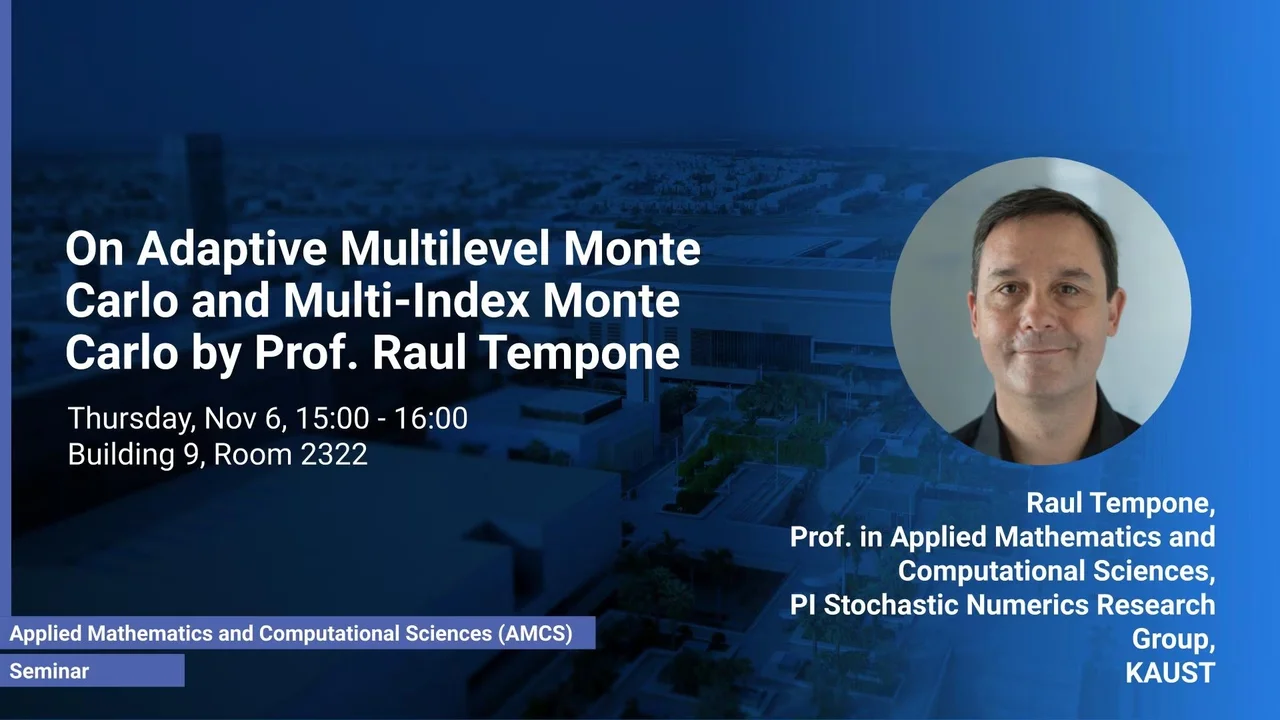
On Adaptive Multilevel Monte Carlo and Multi-Index Monte Carlo by Prof. Raul Tempone
We provide a quick glance into recently developed Adaptive Multilevel Monte Carlo (MLMC) Methods for the following widely applied mathematical models: (i) Itô Stochastic Differential Equations, (ii) Stochastic Reaction Networks modeled by Pure Jump Markov Processes and (iii) Partial Differential Equations with random inputs.
Overview
Abstract
We provide a quick glance into recently developed Adaptive Multilevel Monte Carlo (MLMC) Methods for the following widely applied mathematical models: (i) Itô Stochastic Differential Equations, (ii) Stochastic Reaction Networks modeled by Pure Jump Markov Processes and (iii) Partial Differential Equations with random inputs. In this context, the notion of adaptivity includes several aspects such as mesh refinements based on either a priori or a posteriori error estimates, the local choice of different time stepping methods and the selection of the total number of levels and the number of samples at different levels. Our Adaptive MLMC estimator is based on a hierarchy of adaptively refined, non-uniform time discretizations, and, as such, it may be considered a generalization of the uniform discretization MLMC method introduced independently by M. Giles and S. Heinrich. In particular, we show that under some assumptions our adaptive MLMC algorithms are asymptotically accurate and have the correct complexity with an improved control of the complexity constant factor in the asymptotic analysis. Moreover, we show the asymptotic normality of the statistical error in the MLMC estimator, justifying in this way our error estimate that allows prescribing both the required accuracy and confidence level in the final result. We will show several examples, including some dynamics with singularities and/or non-smooth observables, to illustrate the above results and the corresponding computational savings. Finally, we will briefly describe the Multi Index Monte Carlo method, presenting new and improved complexity results which are natural generalizations of Giles's MLMC analysis.
Brief Biography
R. Tempone received his Ph.D. in Numerical Analysis at the Royal Institute of Technology in Stockholm, Sweden in 2002. He has been an Associate Professor with KAUST since 2009 and the Director of the Strategic Research Initiative Center for Uncertainty Quantification since April 2012. Before that, he was an Assistant Professor with Mathematics and Scientific Computing at Florida State University, Tallahasee, from 2005 until 2009. From 2003 until 2005 he was an ICES Postdoctoral Fellow at the University of Texas, Austin. He is currently an associate editor for the following journals: SIAM Scientific Computing, BIT Numerical and Mathematics and Computers & Mathematics with Applications. He is interested in the numerical implementation and analysis of adaptive approximations for deterministic and stochastic differential equations. These include, among others, sampling methods like Monte Carlo and Multi Level Monte Carlo and sparse approximations like Stochastic Collocation and Stochastic Galerkin. He is also interested in Multiscale and Mean Field approximation for prediction and inference, Experimental Design and Model Validation.
Refreshments: Available @ 02:45pm
